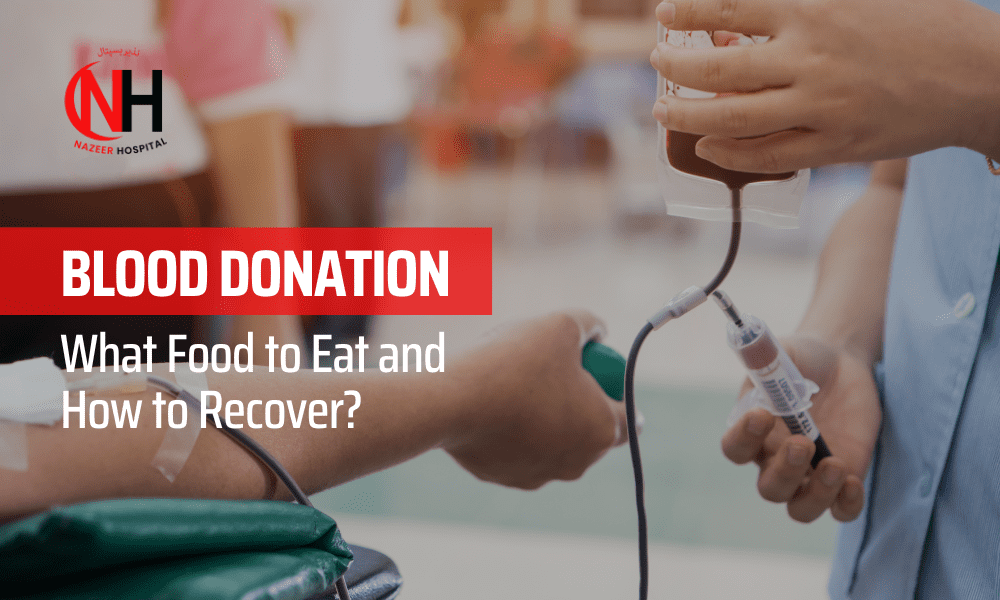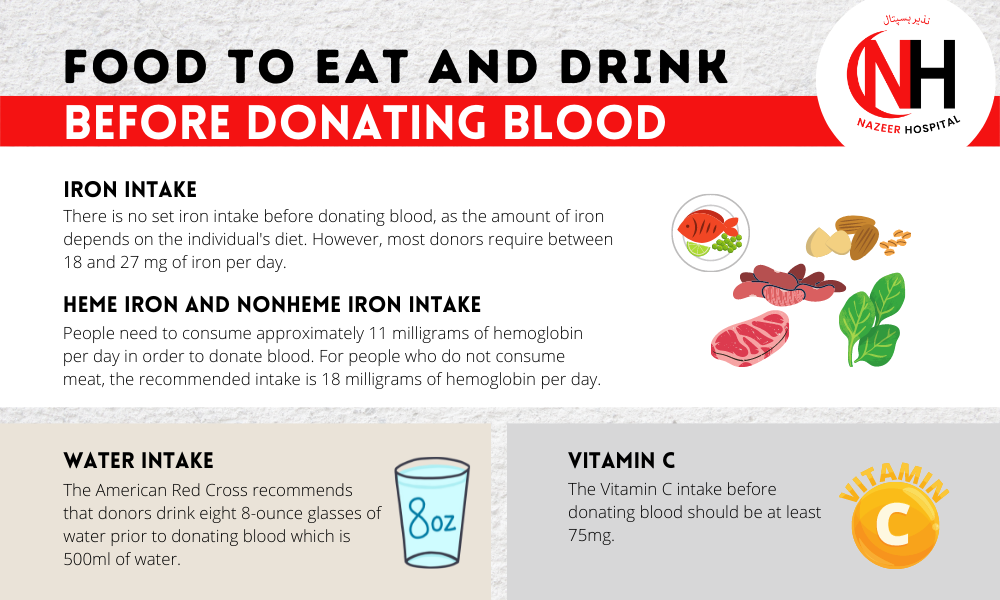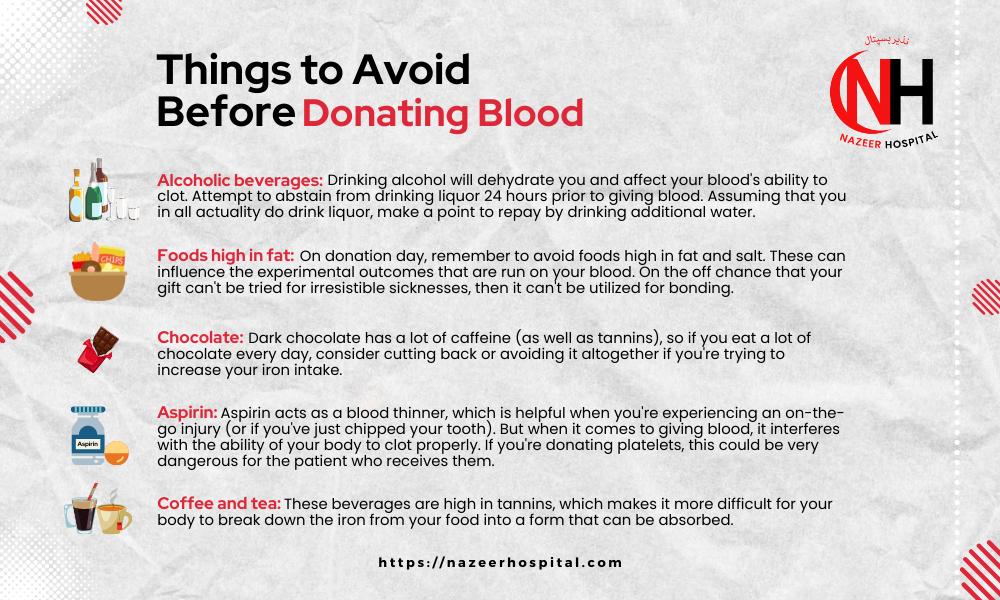Blood Donation - What Food to Eat and How to Recover?
Benefits of Blood Donation
- Can lower dangerous iron stores
- Could reduce your chance of having a heart attack
- May lower your chance of getting cancer(quote study.)
- Can support the health of your liver
- Is beneficial for mental health
Tips For Blood Donation
- First, eat a healthy meal before donating.
- Keep yourself hydrated after donation for at least several days.
- Do not exert or strain yourself for 24 hours after donating blood.
Blood Donation Chart
Blood Donation Age Limit
- HIV
- Hepatitis A, B, or C
- Cancer
- Heart Disease
- Chronic Bleeding in the Digestive Tract
- High Blood Pressure
- Diabetes
- Chronic Kidney Disease
- Chronic Liver Disease
- Any Immune System Disorder
- Anemia
- Bleeding Problems
- Blood Clotting Problems
- Lymphoma or Leukemia
- Leukemia or Other Blood Cancers
- Recent Chemotherapy
- Recent Radiation Therapy
- Surgery within the Past Three Months
- Recent Blood Transfusions
- Severe Burns
- Acute Infections
- Pregnancy
Food to Eat and Drink Before Donating Blood
1. Iron
A. Heme Iron
- Meats: e.g Pork, Veal, Beef, Lamb, Ham, and Dried Beef.
- Poultry: Such as Chicken and Turkey.
- Fish and Shellfish: e.g Tuna, Haddock, Shrimp, Clams, and Mackerel.
- Organs e.g Liver.
- Eggs
B. Non-Heme Iron
- Vegetables: Broccoli, Spinach, Sweet Potatoes, Peas, Beet Greens
- Bread And Cereals: Wheat Bran Cereals, Cornmeal, Oats, Enriched White Bread, Enriched Cereal, Whole-Wheat Bread, Enriched Pasta, And Enriched Rice.
- Fruits: Strawberries, Watermelon, Prune Juice, Dried Apricots, Dried Peaches, Raisins, Dates, Figs (Dried)
- Beans: Tofu (Soybeans); Kidney Beans; Garbanzo Beans, White Beans, Dried Peas, Dried Beans, Lentils
- Eggs
2. Water
3. Vitamin C
Things to Avoid Before Donating Blood
Best Food to Eat After Blood Donation?
Food After Blood Donation:
Advantages and Disadvantages of Blood Donation In A Variety of Medical Conditions
Advantages of Blood Transfusion For The Recipient:
- Experience bleeding from an injury, whether internal or external.
- Have sickle cell disease or another blood-related illness.
- Are currently Undergoing cancer treatment;
- Have recently undergone surgery, such as cardiovascular or orthopedic surgery.
- Some need plasma or other blood products for therapies because they have an inherited lack of blood components or are receiving a transplant, or both
- Serious medical conditions, such as serious blood disorder "Thalassemia Major", may need blood transfusions to treat it. People suffering from diseases such as Thalasemia often require regular whole blood transfusions while others may require regular transfusions of platelets
- Undergoing treatment for infections, such as sepsis, etc.
- Undergoing treatment for having a shortage of blood due to a disease, such as leukemia.
- Undergoing treatment for kidney disease, liver disease, and diabetes.
- And more
Disadvantages of Blood Transfusions:
- There is a small risk of contracting blood-borne diseases, such as AIDS, through transfusion.
- A blood transfusion can be a time-consuming process.
- Blood transfusions can cause allergic reactions that can become life threatening if not performed under supervision.
- If performed without necessary aseptic techniques, infections can be introduced into the bloodstream leading to Septic Shock.
- In some cases, blood transfusions are not given at all, because of the medical and emotional risks associated with them.
- Examining potential donors' medical histories and screening for communicable diseases.
- Use fresh needles every time you are donating blood
- Having qualified personnel available
- Providing supervision and hydration to enable a secure recovery
- Weakness
- Dizziness
- Feeling Weak
- Mental Fogginess
- Stomach Cramps
- Bleeding From a Needlestick
- Experiencing Pain or Bleeding Under the Skin at the Site Where Blood is Down.
Blood Donation in Islam
- Minor Headaches
- Fatigue
- A Mild Fever
- Experiencing pain in their arms, legs, or chest.
- Feel lightheaded or dizzy.
- Experiencing nausea, vomiting, diarrhea, or constipation.
- Bleeding gums or bruising
- Feel jittery or anxious
- Experiencing a sore throat, fever, chills, or flu-like symptoms.
- Experiencing increased heart rate or shortness of breath.
- Experiencing an itchy rash.
- Experiencing abdominal pain or discomfort.
- Having difficulty urinating.
Frequently Asked Questions
- You can’t donate blood if any of the following apply to you:
- Suffer from communicable disease.
- Have ongoing cardiac disease recently.
- Have received any blood products, such as platelets, plasma, or blood.
- Are pregnant, breastfeeding, or have recently given birth.
- Are taking any prescription or over-the-counter medications that could affect blood clotting.
- Have had a blood transfusion in the past 12 months.
- Have had a severe blood disease in the past.
This question lacks a conclusive response, as the rarest blood type can vary depending on the studied population. However, some blood types that may be considered to be rare are O, A, and AB. However, AB-negative blood is considered to be the rarest; only 1% of our donors have AB-negative, the rarest of the eight major blood types. Despite being rare, there is little demand for AB-negative blood, and we have no trouble finding donors with this type of blood. Rarity and demand of O-ve (Negative) Blood type.
DR. KAMRAN ULLAH

Being an enthusiastic and well-trained entry-level physician who seeks to provide high-quality health care to help maximize patients’ well-being and facility profitability. Very resourceful and compassionate familiar with diagnosis and treatment of a wide range of diseases and health concerns.
DR. KAMRAN graduated from Khyber Medical University Peshawar. He has working experience at Rehman Medical Institute Peshawar, Agha Khan Hospital Karachi, PIMS Hospital Islamabad, and Mega Medical Complex Rawalpindi.
He has vast knowledge and experience and skills in the medical field. He is a highly dedicated and devoted doctor. He has worked on different medical research and published different research articles.
He is also a social activist and runs different social welfare organisations for the last 7 years, serving humanity and the needy. His main expertise are in the management of critically ill patients, patient care, health care quality, and safety.





